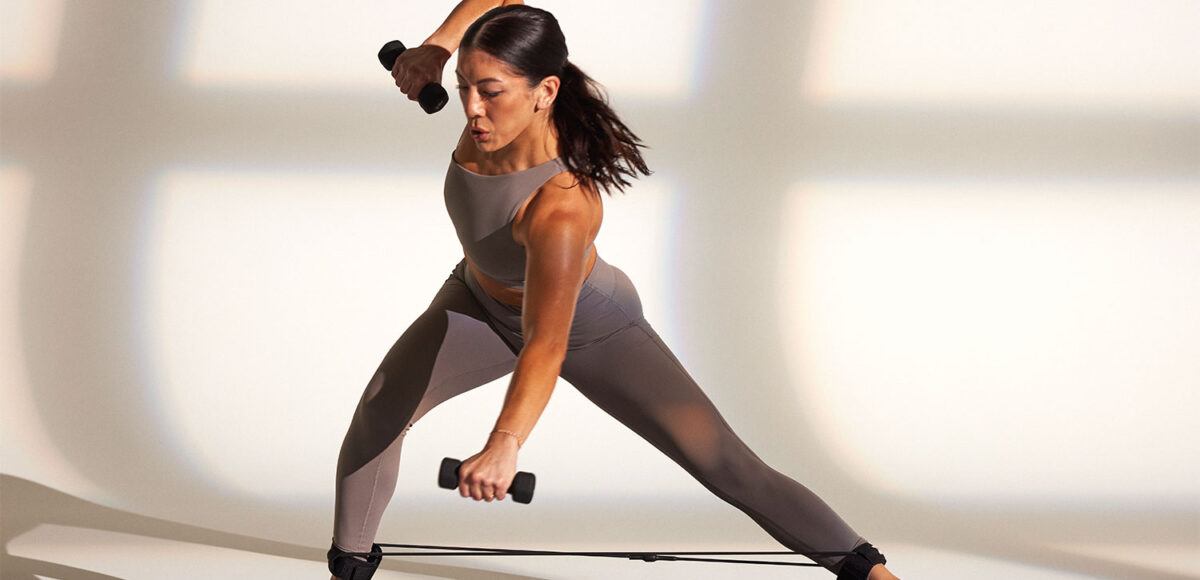Fitness is all about choices these days. Whether it’s a favorite boutique fitness studio or an app at our fingertips, we’re combining traditional ways of staying in shape with modern digital options, resulting in consistent workouts and healthier, stronger bodies.
A recent study by Statista charted the dawn of the digital fitness age. According to its findings, in 2019, there were 8.5 million fitness mobile apps downloaded. In 2020, the number swelled to 16.8 million (we all know why). In the intervening years, downloads have held steady at around 16 million. According to a recent forecast by Allied Market Research, the global fitness app market was valued at $13.78 billion in 2020. It’s projected to reach $120.37 billion by 2030.
The figures for 2024 so far reflect the rise of a recent fitness trend—the hybrid workout model, a personalized mix of an old school, in-person gym experience, and a new school, high-tech, at-home one for the ultimate flexibility.
Leading the market is a group of trainers whose two-way livestreams, social media posts and on-demand videos have catapulted them to celebrity status. Collectively, millions around the world log on to their virtual classes.
Lucky for Beverly Hills, their home base is your backyard. So, not only can you livestream with your favorite workout instructor, but you also have the option of catching a class in real life with them.
Here are some of the top “fit-fluencers” and “fit-trepreneurs” who are ready to sweat with you—either virtually or in person. Whether you’re looking for tried and true workouts like yoga and classical Pilates or you’re ready to try something new like low-impact resistance training, dance cardio or high-intensity boxing, you might just find your next workout obsession.
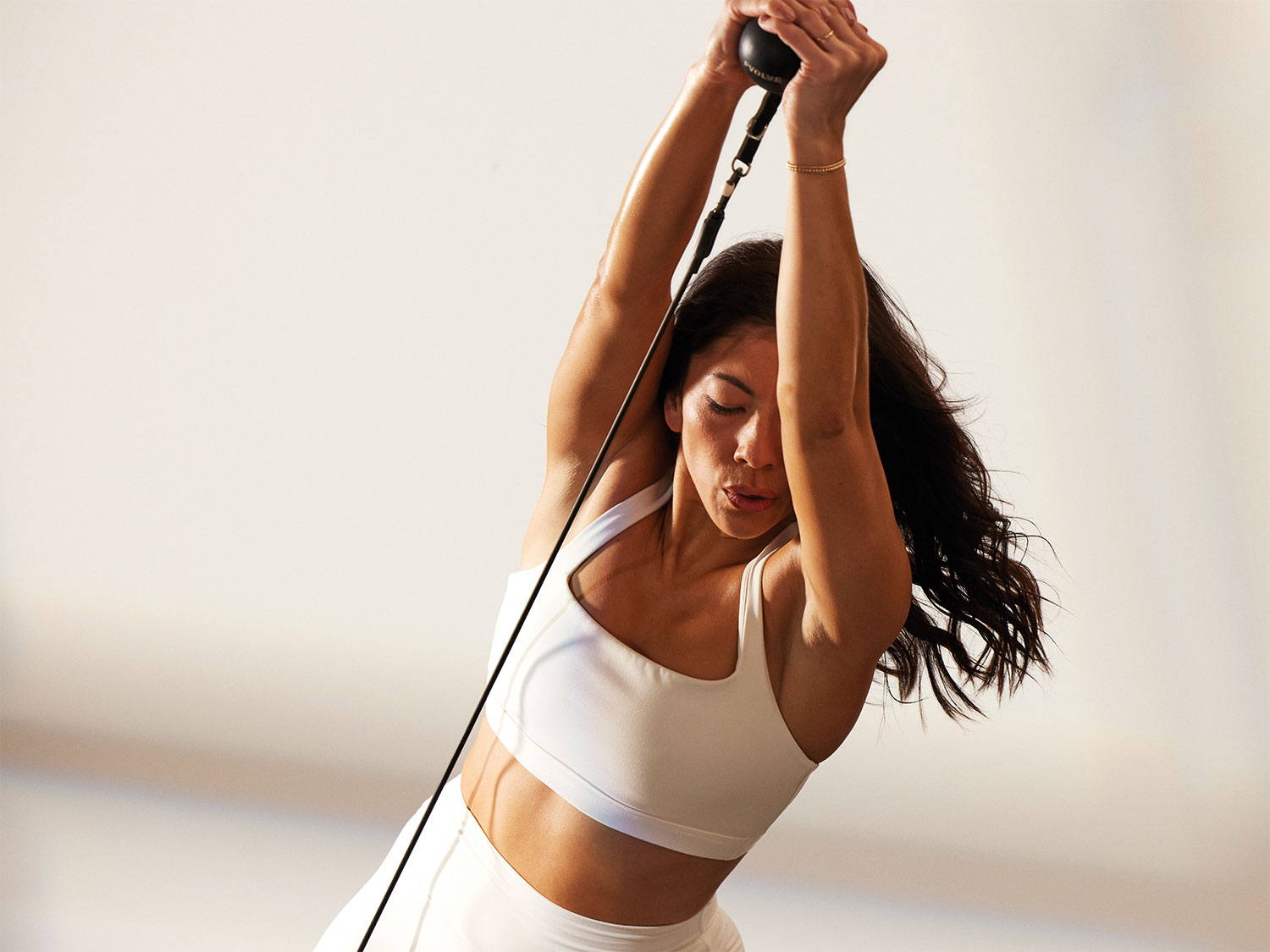
PHoto Courtesy of pvolve
DANI COLEMAN
Pvolve
From its launch in 2017, Pvolve was set up by its founder, Rachel Katzman, as an omnichannel brand with on-demand and live virtual workouts, brick-and-mortar studios and dedicated social media content across all platforms. It was well received from the start, but membership skyrocketed during the pandemic when tens of thousands discovered Pvolve (which stands for “personal evolution”) and former professional dancer, Dani Coleman.
Coleman joined the fitness company as head trainer in 2020. A few months later, when gyms and studios were forced to close, her job mainly consisted of filming on-demand videos and teaching live virtual classes. Coleman quickly became one of the fitness brand’s most popular trainers. Around the same time, Jennifer Aniston found Coleman’s Pvolve livestream workouts online, logged on to her classes anonymously, and followed along, quickly becoming obsessed. Coleman is now Aniston’s personal Pvolve trainer, and the pair work out several times a week together. As for the “Friends” star, her obsession with Pvolve led to her officially joining as a partner in the company last year.
“I was so excited to hear Jennifer Aniston was a secret streamer of our online workouts,” said Coleman. “I feel grateful Pvolve has brought us together. In working with Jen, I’ve learned she loves a challenging workout. It’s rewarding to support her in getting the results she wants and for her to see how she doesn’t have to strain or break her body to achieve them.”
For Katzman, this is what Pvolve is all about. “I think the hottest trend is longevity,” she added. “People are starting to understand what we do to our bodies today will impact us in three, five, 10-plus years, and the wear and tear we may be able to take in our early 20s will have a dramatic negative impact on us later in life. You don’t have to walk around with shoulder, neck or back pain anymore, and you shouldn’t have to sacrifice reaching your physical goals in order to feel good in your body.”
Pvolve is now a coast-to-coast fitness phenomenon. Last year, the low-impact resistance training program doubled its subscribers and had a 40% increase in studio memberships. It has a celebrity following that includes pop star Olivia Rodrigo and actress Dakota Johnson. There are four owned and operated Pvolve studios, one in Chicago, another in New York, and soon, two in Los Angeles. The sunlit, breezy flagship in West Hollywood features a state-of-the-art studio with a stunning rooftop deck for outdoor classes and private training, locker rooms and a fully stocked primping area. A second outpost is set to open this summer in Santa Monica. In addition, more than 50 Pvolve franchises are currently in the works nationwide.
Whether you take a Pvolve class in-studio, on-demand or as part of the two-way live virtual studio (where members take a live class and directly engage with trainers), the workouts are the same. The Pvolve method involves a series of controlled and precise movements using the company’s proprietary equipment, such as resistance bands of various lengths and resistance strengths and exercise balls like the signature P.ball, designed to float between your thighs to target that hard-to-tone area. Standing on a numbered mat, which acts as your compass, the trainer guides you through proper form, calling out numbers that correspond to numbers on the mat for correct foot and body placement, while you stretch and pull resistance bands or squeeze balls. Those following along at home can purchase equipment bundles (which include the mat, bands and balls) or individual equipment from the company’s website. “Adjusting to teaching virtually was interesting at first,” said Coleman. “But the numbered mat was an absolute game changer.”
A variety of workouts are offered for all formats, from low-impact for toning to a heart-rate bumping combo of cardio and form-focused strength training. There’s also a stretch class and a progressive weight training program, designed for women over 40, or anyone looking to build strength. Many of the workouts are geared toward women, such as pelvic floor strengthening exercises, and workouts for every stage of a woman’s cycle, from menstrual to pre/postnatal to menopause. Pvolve’s in-studio workouts are 45 minutes and virtual workouts range from 15 minutes to an hour, with equipment or no equipment options.
To connect with her virtual fans, Coleman uses her social media but doesn’t let it consume her life. “I understand the importance of content creation and these virtual spaces. However, I personally try not to get caught up in them and stay focused on what’s important. For me, that is making health and fitness spaces more accessible, equitable and diverse. I hope that’s represented when you see the work I am doing.”
In person, Coleman, who teaches exclusively at the West Hollywood studio, is a force of nature. She’s that cool girl you want to be friends with, the one who’s so confident and comfortable in her skin, but down-to-earth and completely approachable. It’s no wonder her classes fill up fast.
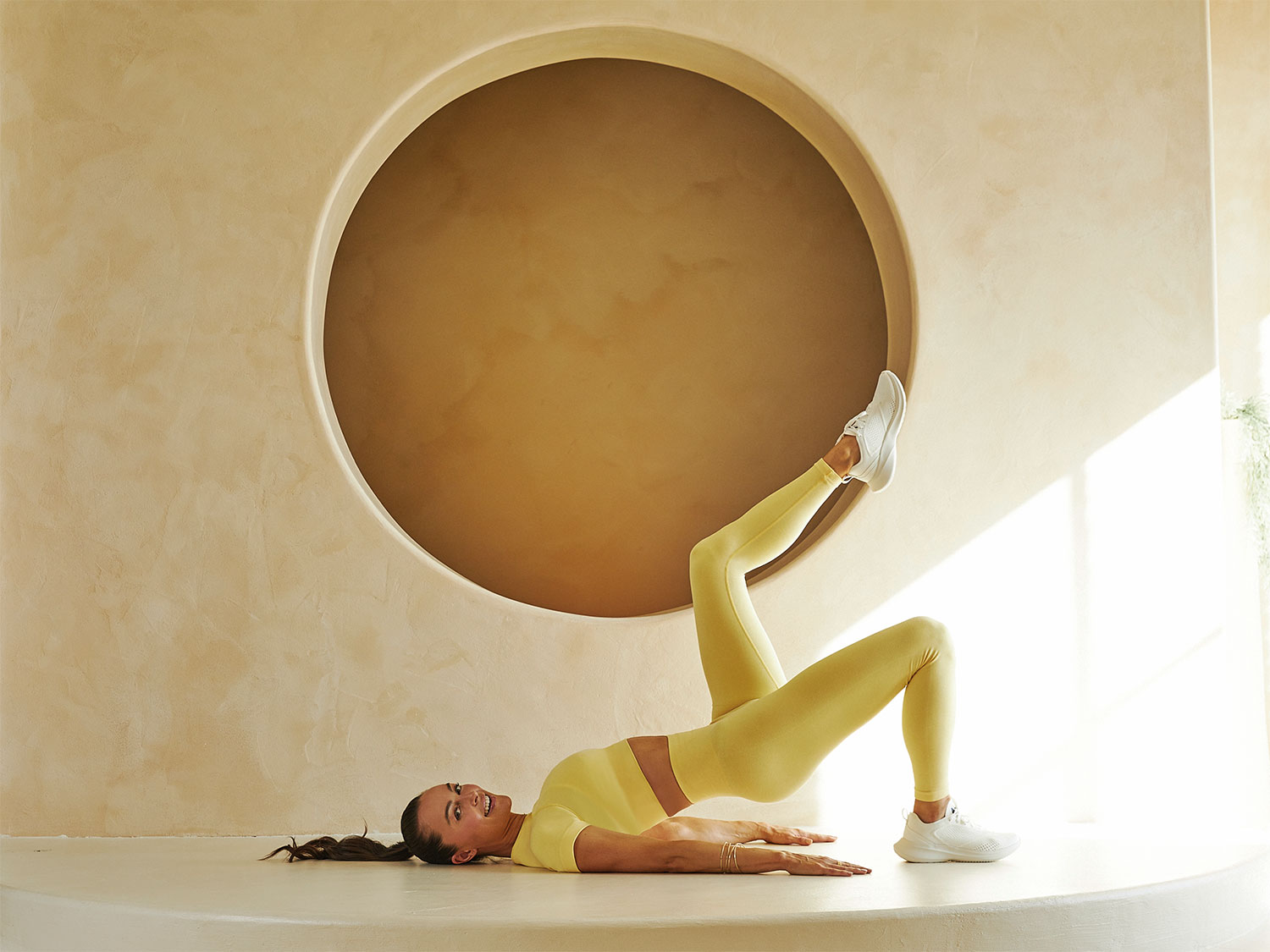
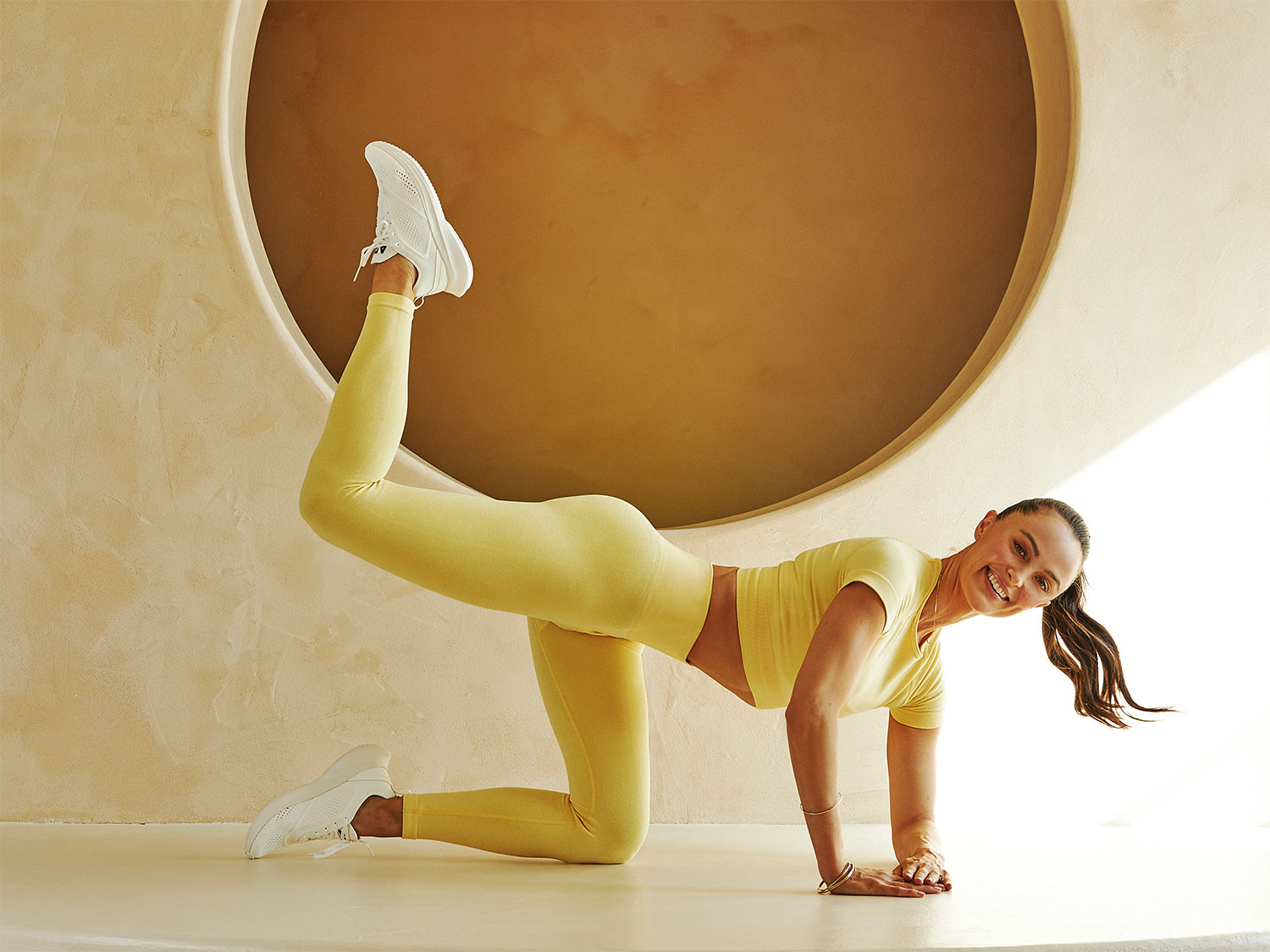
PHotos Courtesy of The Sculpt Society
MEGAN ROUP
The Sculpt Society
Certified celebrity fitness trainer Megan Roup launched The Sculpt Society (TSS) app in 2017. Roup already had a massive social media presence and regularly posted videos of her workouts and fitness advice to her more than 500,000 followers. Realizing she had a built-in audience who craved her content, the former New Jersey Nets dancer decided to create a platform where members could access a variety of simple, upbeat and energetic at-home workouts with no equipment required. It took off. “Pandemic or no pandemic, I think the rise of digital fitness would have to happen,” said Roup.
Today, the app has hundreds of thousands of members who can stream from anywhere in the world, on any device. They can choose between dance-cardio, sculpting, yoga and meditation, and “quickie” workouts lasting 10 minutes to full 45-minute burn-a-thons.
To connect with virtual members, some halfway around the world, Roup invites them to stay on the video link for a “coffee chat” after each live workout. There’s also a private TSS Facebook Group, for subscribing members only, where they can connect with Roup and one another. “There’s conversation and connection there,” she said. “I’m just constantly talking with my community, on Instagram and direct messages [as well]. I feel really lucky in that way. I think that’s the beauty of social media; you really have a direct line to clients and members and can just listen to them and their needs and what they’re looking for; it’s really important. Those are definitely the biggest ways I connect with them. And then, of course, pop-ups around the country where I get to, you know, meet them in real life!”
In 2021, pregnant with her first baby, Roup and her husband moved across the country from New York City to West Hollywood, to be close to the fitness instructor’s family in Santa Barbara and the fitness capital of the world. While at this stage Roup has no plans to open a brick-and-mortar studio, she set up a weekly residency at Playground West Hollywood, where L.A. area locals can catch a Sculpt class with Roup every Wednesday at 9:30 a.m., if they can score a spot.
In addition, Roup is also a full-time content creator for Instagram and TikTok, requiring her to post several times a day on each platform. She spends a lot of time making videos. “These are often me just walking my community through my day pretty organically,” she said. “Then I go live and create content for the TSS app.” The videos might look like big budget productions, but Roup said, “I literally film in my kitchen. I’m the lighting director, the videographer and the editor. I set it all up myself.”
Besides the infectious energy and generous spirit she brings to her workouts, what sets Sculpt apart?
“I’m a really big believer in short workouts. They make it easier for my members to show up consistently and make working out a habit. Consistency is what makes it effective,” she said. “Time and time again, we hear from our members they feel they’ve gone on this life journey with me. And at each stage, there’s something new for them and they feel so supported through it all with us. So, I think it’s the combination of those things, making working out fun again, joyful and effective.”
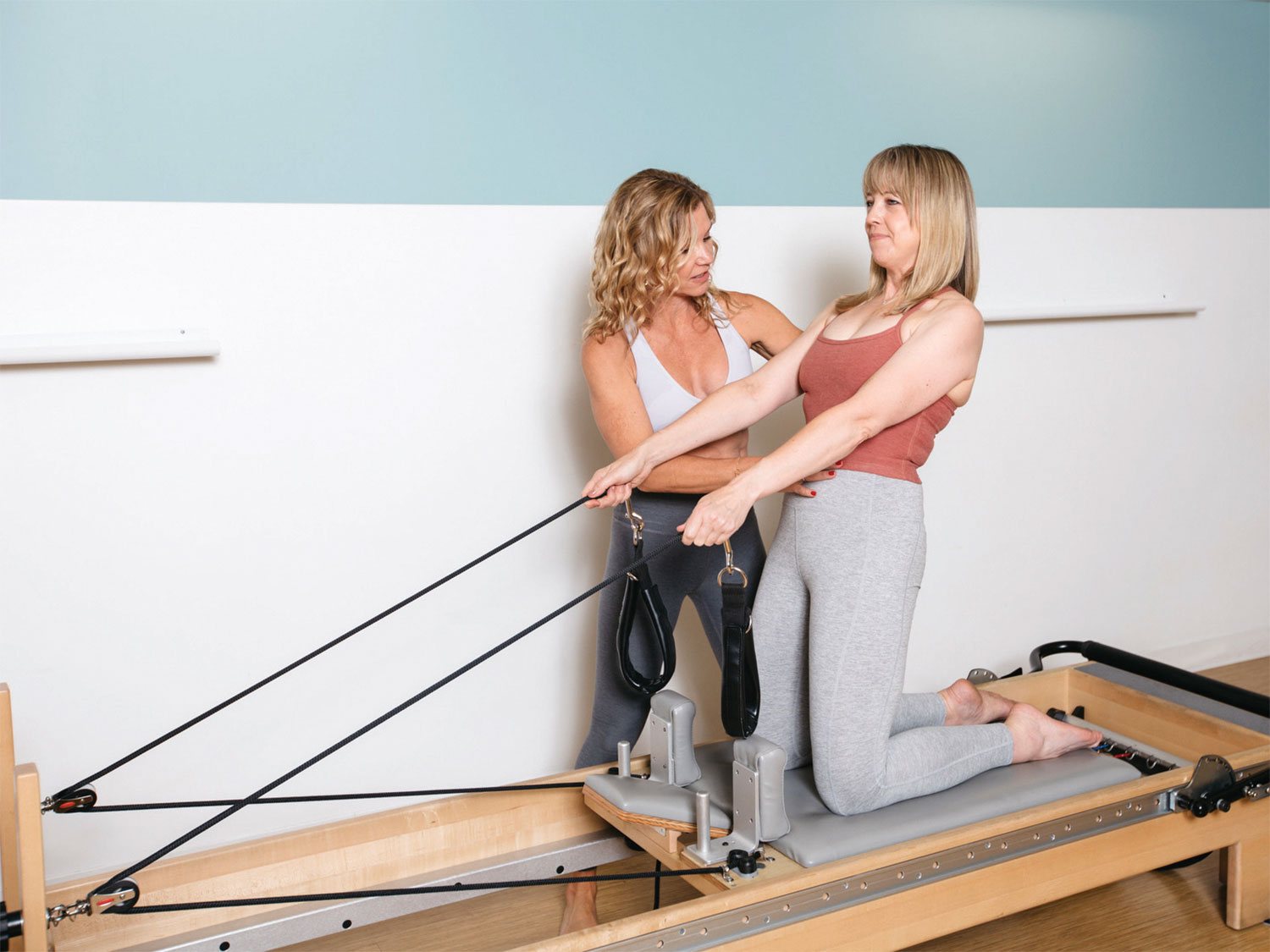
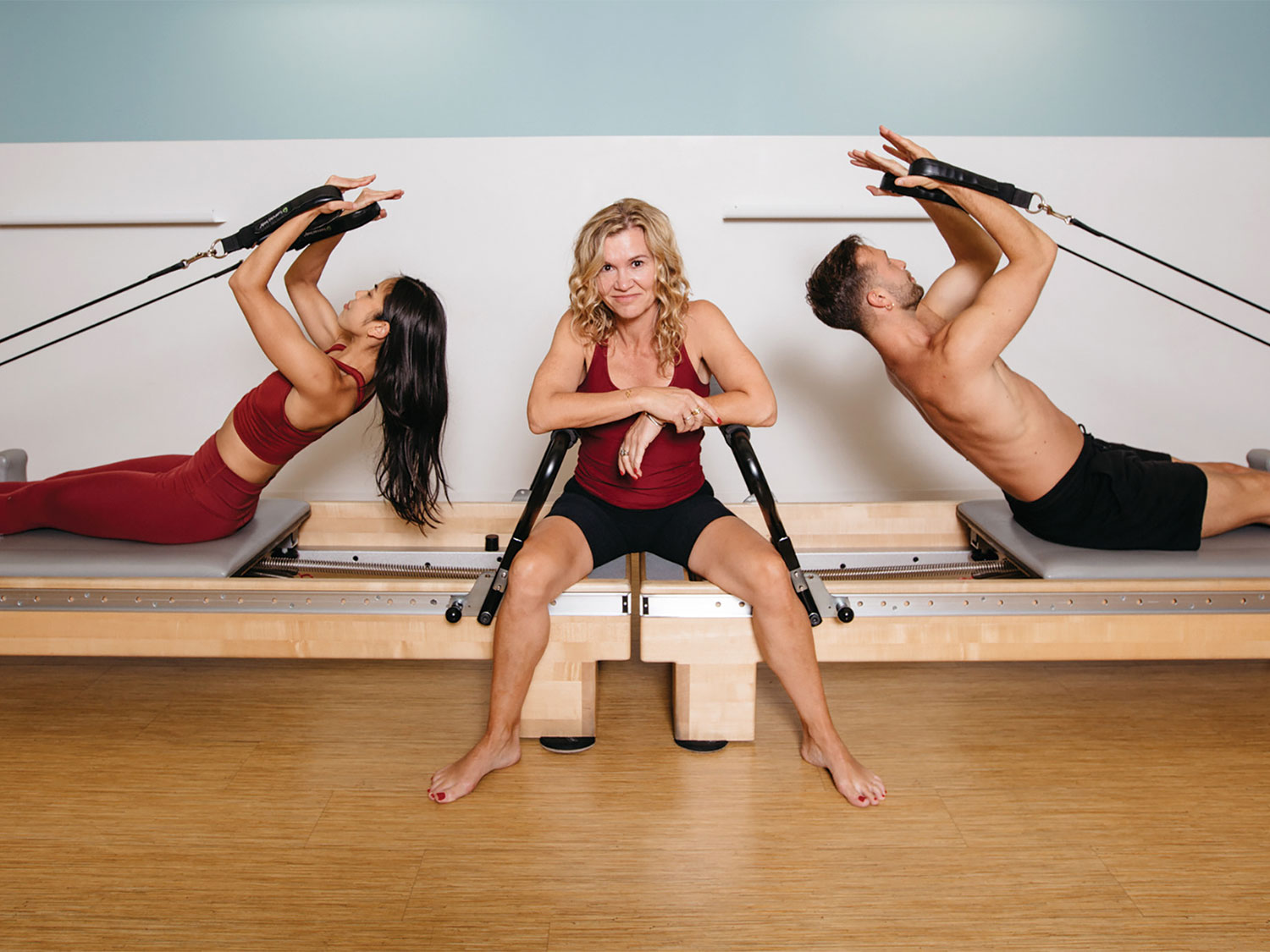
Photos by Ryan Vermilion
MARIA LEONE
Bodyline Pilates
From a small office at the front of her Beverly Hills Bodyline studio, fitness instructor Maria Leone explained how, after two decades teaching Pilates in Beverly Hills, she unwittingly became one of the top Pilates “fit-fluencers” in Los Angeles.
“The other day, my 19-year-old daughter told me, ‘Mom, Pilates is really popular right now, all my friends are doing it!’ And to me, 19-year-olds are the barometer; if they’re doing something, it really has become a thing,” Leone said. Certainly, when pics of Harry Styles at a Pilates studio in London recently went viral on social media, the decades-old exercise received a measurable uptick.
Leone’s past and current private clients have included a mix of Olympic athletes, industry elites and celebrities (from A-list to reality show megastars). In addition to the four to five private lessons she holds, either in person at the Beverly Hills studio or via video with those who live outside the area, Leone leads two to three group classes per week. On weekends, she drives to the private homes of her exclusive clients who can afford the heftier fee, about $400-$600 per 45-minute session. Not all of them are hiding from paparazzi, though. “Some just don’t want to drive and deal with parking, and they can afford it,” Leone said.
On top of all of that, five times a week she shoots and edits short video segments for her Instagram feed, @bodylinela, which currently has over 130,000 followers and growing. Earlier this year, she added a paid subscription page for fans who want more of her content. Membership grants them access to a stripped-down version of Leone. “I don’t have to really worry about what I look like or what I have on or if [the video] is catchy. It’s very freeing in a way. And I can show other things that I don’t want to show the whole world, even stuff about my body that I don’t particularly like.” Leone recently shared a poignant video of her and her mother, who has advanced dementia, in a segment about the benefits of Pilates on Alzheimer’s patients. It’s these types of private moments Leone also reserves for her closest subscribers.
Of course, keeping up with the subscription page requires more content, about three to four additional videos to shoot, edit and post per week.
Leone, a professional dancer who’s worked with Debbie Allen and Paula Abdul, leaned on her background as a performer and educator. “I’m not going to go out there and show my body and cute outfits. I can’t do that, but I can do who I am on Instagram and just see what happens.” Turns out people were interested. A lot of people.
“There wasn’t anyone else on that platform doing my take on Pilates, which is very much about educating the people in my industry.”
In terms of Pilates, Leone has somewhat of a coveted pedigree. She studied classical Pilates under Mari Windsor, who brought Pilates into the mainstream. Her West Hollywood studio was a Who’s Who of Hollywood, and everyone from Dustin Hoffman to Miley Cyrus were her clients. Windsor was trained by Romana Kryzanowska, one of the few protégées of Joseph Pilates, the inventor of the exercise and its contraptions himself. And in the age of mashup workouts, Pilates purists from far and wide have sought out Leone, virtually and in person.
In addition to creating content for social media, Leone also shoots videos for her Bodyline Pilates YouTube channel and on-demand streaming service, which have tens of thousands of views. Most are of Leone working with people of every age, athletic ability and size, and it resonated.
“So many more people know about me now, and it’s amazing. And I’m not showing rock-solid bodies. I’m talking about moving and feeling connected and teaching people about their bodies and helping different types of bodies.”
Leone added, “But, there’s nothing like in-person training.”
Until recently, her studio offered one-on-one private Pilates lessons almost exclusively. Due to the rising demand for group workouts and the enormous popularity of ClassPass, Leone has begun to add a few group sessions to the studio’s schedule. “You need eyes on you,” she said. “It’s an energy exchange, too. It’s not just the class, it’s the place, the environment, the people, the culture; it all makes a difference.”
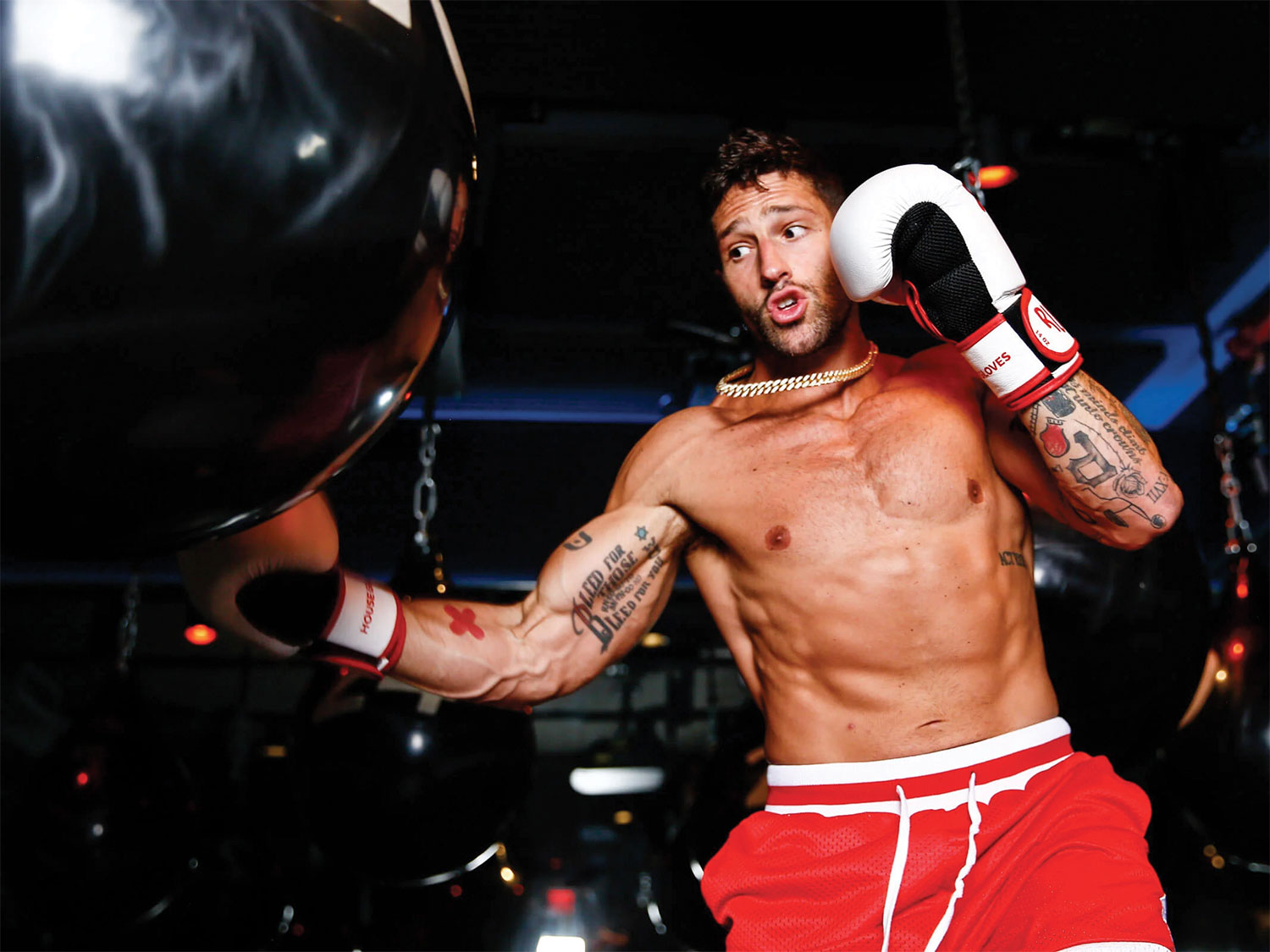
Photo by Ian Passmore
NOAH NEIMAN
Rumble Boxing
Fat burning, stress relieving, metabolism increasing, the benefits of boxing go on and on. It’s quickly gaining traction as one of today’s hottest workouts. And no place is hotter to hit the bag right now than Rumble, which has celebrity fans from David Beckham to Kendall Jenner KO’d.
Founded in 2017 by Noah Neiman, Rumble is now part of Xponential Fitness, one of the largest global boutique fitness brand franchise groups. Currently, there are 80 Rumble boxing gyms around the country and the world (from Australia to Tokyo), with an additional 350 set to open within the next two years.
Neiman hails from Barry’s Bootcamp, where he was a master trainer for the fitness company for several years. “While I was there, I kind of built up my own personal brand on social media,” said Neiman. “I’ve been training, boxing and doing jiu-jitsu and martial arts my whole life, and just fell in love with the calmness that it brought me. So, I wanted to bring that discipline to the world and do it in a way that had a much bigger chance of being digestible to the mass public because I grew up in the dirty, dingy boxing gyms of Pittsburgh and New York. And I love them. But I know that the average consumer isn’t going to love that.”
Neiman opened the enormously popular West Hollywood location in 2018. It remains the only corporate-owned Rumble boxing gym, as well as the company’s headquarters. As such, it’s massive, 6,600 square feet, and houses state-of-the-art amenities like infrared saunas and hyperbaric chambers. With its dim lighting and endorphin-inducing tunes thumping through the sound system, the vibe is more nightclub than dingy boxing gym. The playlists, custom hip-hop and house music mashups, are curated in-house and designed to get you pumped.
“It gives you a level of confidence that you can throw some punches and know what you’re doing, and you’re as strong and healthy as you can be. And that’s the most important thing.”
– Noah Neiman,
Rumble Boxing Founder
Each 45-minute workout features a mix of high-intensity interval training, metabolic conditioning, weightlifting and, of course, boxing. About half of the workout is spent pounding the company’s proprietary water-filled, tear-dropped-shaped bags. “I didn’t want to open a boxing space where you just box. I knew the efficacy of a workout was tied to having some kind of strength-training program as well,” explained Neiman. “So, we don’t just box, we lift weights, from 5 pounds all the way up to 45 pounds. And similar to the Barry’s Bootcamp model, we do squats, lunges, push-ups, pull-ups, curls and shoulder presses. We work your chest, your back, your abs, your cardiovascular, and you get to punch things.”
If you’ve never thrown a fist, fear not, you’ll be instructed on the six basic punches before you begin. Advanced pugilists have several options to stay fit, from express 30-minute workouts to 60 minutes and 12 rounds of boxing and strength training.
While Rumble’s emphasis is on in-person training, the company’s app gives members priority status when booking appointments. They can also chart their progress with the in-app tracker and connect with other members. Rumble-branded boxing workout videos are also available on-demand to members through the XPlus app, owned by Rumble’s partner Xponential. There, they can find a host of prerecorded at-home, Peloton-style workouts, with live component options as well.
“This is what I really believe can help communities, which was the ultimate goal, to give people an outlet, a safe place to express their physicality and to get better at fighting,” said Neiman. “It gives you a level of confidence that you can throw some punches and know what you’re doing, and you’re as strong and healthy as you can be. And that’s the most important thing.”



